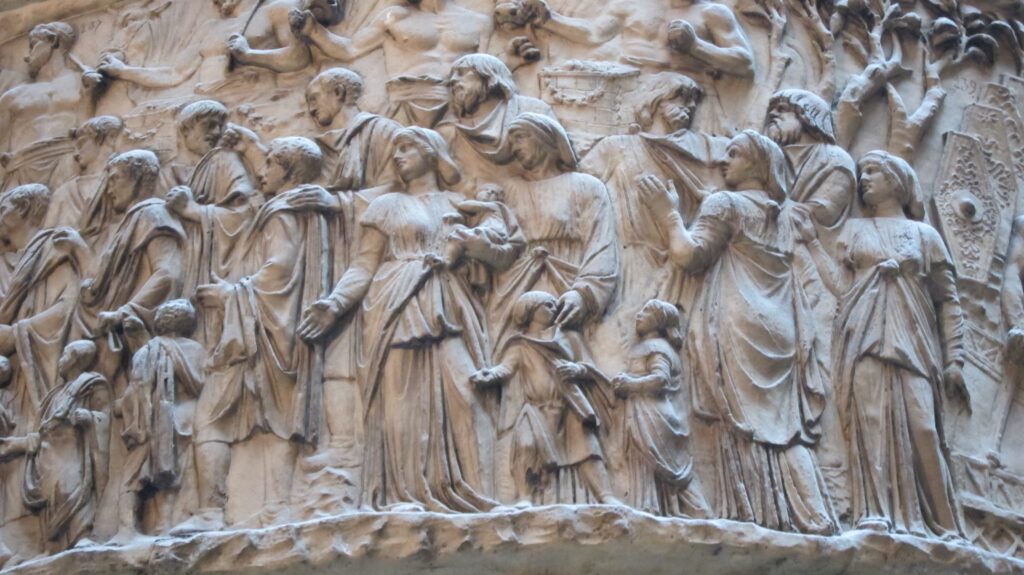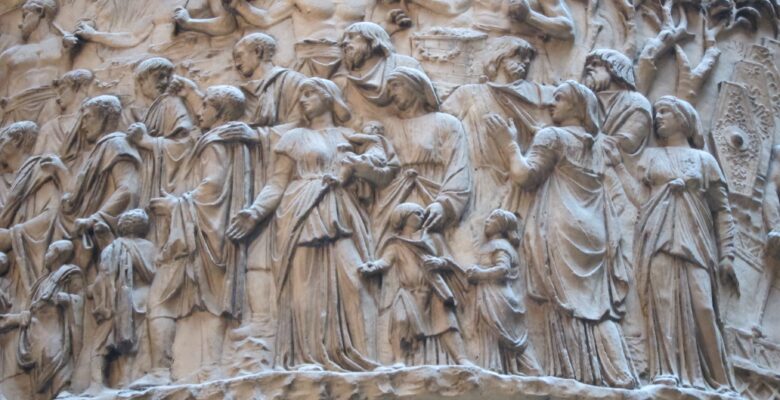A memorial for a tough woman
In previous years, on occasion of International Women’s Day, we celebrated a selection of women from across the Roman Empire: you may read our pieces here and here.
In 2022, with fresh horrors, misery, and suffering unfolding in front of our eyes (and an acute awareness that it is one of several such events in the world at present: a statement that does nothing to distract from the unspeakable scenes), we would like to take a different approach.
Today, with all the devastation, all the despair, all the human suffering clearly visible to us in our own times, we should force ourselves a fresh look back at scenes that we have always known: scenes whose existence and presence we have always felt (and then chosen to downplay or ignore). And we must allow them to make a fresh impression on us, to adjust the all-too-common, long-established war-related romanticism in the field of Classics.
Is it possible, for example, with recent and current images in mind, to look at “frontier women” on Trajan’s column, Rome’s famous landmark monument commemorating Trajan’s Dacian Wars, in the same way as we did before?
Hardly:

When it comes to military affairs, Roman literature has a remarkable ability to downplay, and even to eclipse, the individual in favour of the group (already the Elder Cato noticed that in his comments regarding a Roman military man whose achievements rivaled those of Leonidas, but who never received the same acclaim). And suffering? Suffering usually is merely a prerequisite for subsequent heroism.
Rarely are we allowed a glimpse of those who suffered, alone or with their family, on the Roman side or (even less common) on that of Rome’s opponents.
But there is some evidence that deserves to be seen and heard (and listened to) – evidence that deserves to be shown, here and now, on International Women’s Day 2022.
This is the evidence of one Antonia Severa.
Antonia Severa’s life story is recorded on an inscribed marble tablet, datable to the fourth century A. D. The item, set up by her husband (whose name is lost due to physical damage of the object) was found in the catacombs of the city of Rome, and it is now kept in the Vatican museum.
The text of Antonia Severa’s inscription, a composition consisting of ten hexametrical lines following a (damaged) prose prescript that records the nomenclature, reads and translates as follows (CIL VI 12072 (cf. p. 3510) = CLE 546 = ICUR n. s. VII 18428 = EDR 149999; an image of the text is available here):
– – – – – –
Antoniae Severae coniugi.
me propter maria terras atque aspera caeli[- – -]
sidera trasisti mediosque timenda per h[ostes]
invenisti viam hiemis nefanda tulisti [- – -]
o dulcis coniunx animo gratissima nostro.
nomine consimilis iugali flore beata
casta pu[di]ca meos thalamos ac fomite a[moris]
nondum suppleta cubilia sancta liquis[ti].
saltem quod superest oro scio namque f[avebis]
funde preces subolum ac votis utere nostri[s]
ut longum vitae liceat transducere tempus
. . . for Antonia Severa, his wife.
On my account you have crossed seas, lands, and the sky’s rough constellations, you even found a way, fearsome, straight through the enemy’s lines, you have succeeded to bear the winter’s unspeakable conditions . . . oh, my sweet wife, most beloved in my heart!
So true to your name, blessed in the flower of our marriage, chaste, and bashful you left my nuptial chamber and our marital bed, saintly, when the supply of kindling of our love had yet not been used up.
What remains at long last, I pray (for I know you will approve): extend our offspring’s prayers, and join our vows, so that we may spend a long lifetime still.
It is easy to get distracted by topical, somewhat self-centred middle lines that are meant to capture and express the mourning husband’s grief over the premature loss of his wife. It seems obvious that he asks for good wishes for his own and their mutual children’s future (long) lives. None of this is spectacular, none of this is surprising – it may, in fact, all seem a bit platitudinal.
But there is this incredibly strong beginning of the piece.
Antonia Severa appears to have gone through a lot. Nothing topical here. Antonia Severa was her husband’s companion, and in that she appears to have endured much: the text creates an image of geographical movements that were clearly anything but fun. Moving over land and sea, under adverse conditions.
Remarkably, Antonia Severa appears to have found her way, against the odds, through enemy lines, in enemy territory (or under enemy attack): mediosque timenda per h[ostes] | invenisti viam, ‘you even found a way, fearsome, straight through the enemy’s lines.’
What was the timenda, the fearsome nature, of Antonia Severa’s demeanour? Was her husband a soldier? Did she follow him into embattled regions? Were they somewhere when a sudden enemy attack threatened them, before they came to Rome? Was it in one of the dangerous, northern regions of the empire, as the reference to the unspeakable dangers of winter would suggest?
Antonia Severa’s life was extraordinary, but not necessarily for the reasons that this stone lists. Her hard fate, the hardships and terror that she endured on the path of her life, may have been much more reflective of common experiences in the Roman Empire than any pretence of sheltered, safe lives in other texts. What makes it extraordinary is that, for once, it is recorded.
We may think that, according to our own taste, this husband ought to have made this piece much less about himself, and more about his beloved wife.
Fair enough.
Yet, he managed to create a monument to commemorate a very real female life of the Roman Empire, a life full of dangers and hardship and terror. A woman whose life was defined by her need and ability to live up to the etymological meaning of her name, Severa: ‘stern, harsh, grave, tough’
Today – but not only today! – may be a good day not to celebrate, but to admire in humility, and to offer our support to, those women whose lives, whose families, and whose existences are exposed to the terrifying threats and horrors of a world in which peace, and sometimes even plain survival, seem unattainable.

